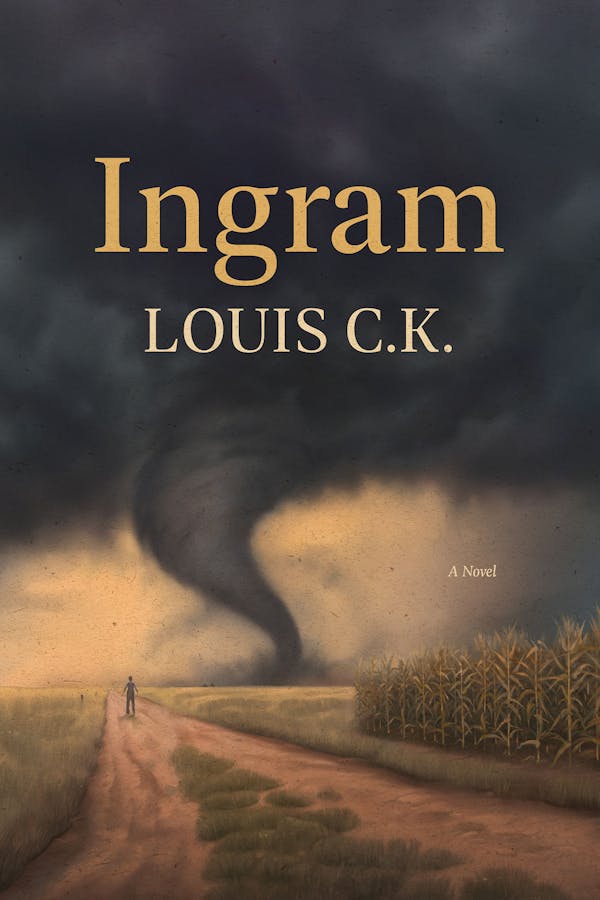On the third page of Ingram, the debut novel by comedian and actor Louis C. K., which releases November 11, the eponymous main character—a child who doesn’t know his last name—sees a couple of men approach his house. They are, he has come to understand, “from the bank.” He knows this means trouble for his poor rural Texas family, who survive by raising animals for food and who seem to know no form of joy or pleasure. Just how rural is young Ingram? This is how he describes the bankers: “They were both wearing full suits of gray clothes and black shoes, and they had ropes of cloth tied snug to their necks, something I’d never seen and looked to me like two Guernsey cows had yanked their ropes in half from where they’d been tied and had run off and got themselves a car.”
From this, we are to understand that our sad, sheltered hero has never seen a necktie before, not that the fashion in his part of Texas includes ties made of rope torn unevenly at the bottom—but you could be forgiven for being a bit confused, because C. K.’s prose throughout Ingram is relentlessly belabored and unclear. The book doesn’t tell you when it takes place until its final third (it doesn’t impact the story, but we won’t spoil it), and it constantly condescends to both its characters and its readers. It’s a baffling imitation of Faulkner by way of Cormac McCarthy. (C. K. has also cited Flannery O’Connor as an influence, which we wouldn’t have guessed.)
To be clear: Louis C. K. is something of an easy target. His well-documented history of sexual harassment, which he has admitted to, has not stopped him from continuing his comedy career (his 2025 tour saw him headline San Antonio’s Majestic Theatre, as well as a four-night stand at Austin’s ACL Live), although it has put him on the list of people we’d prefer not to be stuck on an elevator with. He’s also not a Texan and does not appear to have spent any appreciable amount of time here; earlier this month on Bill Maher’s talk show, in one of the few interviews he’s given since his past proclivities were revealed, he confessed he hadn’t done any research for the book.
It shows, in the content and the style. Consider the opening sentence of chapter 4: “It was early in the nighttime, when the sun is just a stripe on the edge of the sky, like lamplight coming through the bottom crack of a shut door.” In order to describe something as commonplace as a sunset, C. K. employs both a metaphor and a simile, one of which tells the reader to look up while the other suggests they look down. It has all of the depth of “It was a dark and stormy night,” but with none of the brevity.
The dull prose never gets better through Ingram’s 288 pages, and there’s no compelling narrative. The reader is stuck following the titular hero as he wanders around a place that C. K. calls “Texas.” It’s like The Adventures of Huckleberry Finn starring Forrest Gump. Ingram routinely encounters either folks who treat this small, lost child with inexplicable cruelty or, on occasion, a character from a less-savory background who demonstrates what we are encouraged to understand as surprising—perhaps, we are to think, ironic—kindness. Often these are characters of color, a concept Ingram does not understand, just as he does not understand that he is white, or that his whiteness, as he’s told early on, will make his journey easier.
There’s a lot that the author doesn’t know either, especially about Texas. At one point Ingram seems to walk east to Austin from Houston; at another, he seeks a job as a “pipe and drill man” and so ventures down to Brownsville, which, relative to the rest of Texas, isn’t exactly the first place one would look for work in the oil industry. We get it, Louis: Texas is a big state and it’s easy to get the basics wrong. But what really doesn’t ring true in the book is how Texans treat this child.
Texans are rarely actively cruel to kids in need, at least when they’re standing right in front of us. And Ingram is in need. At one point, he awakens naked and sunburned at a construction site, where the only man on the site’s crew who attempts to care for him is harassed by his supervisor for daring to do so while on the clock; a few chapters later, when Ingram, who has never owned shoes, stops in the middle of a Houston street to remove a shard of glass from his foot, he’s threatened by a police officer. Perhaps in New York, where C. K. now lives, police may be so accustomed to scores of unaccompanied young people on the subway that such encounters are commonplace. But bleeding, destitute ten-year-olds are rather more of a novelty in Houston. When Texans come face-to-face with a boy in need, it’s hard to imagine any of us failing to offer at least a moment of kindness, even if we go on to make political choices that further immiserate them. Call it a side effect of living in a place that dismantles its safety nets.
But this sort of nuance is not something C. K. is interested in exploring in Ingram. Its pages are full of stock, one-dimensional characters: a kindly Black woman who offers Ingram a place with her family until the patriarch returns and sends the boy on his way; a group of migrant farmworkers who introduce him to the life of a laborer and the joys of whiskey; a small-time thief who takes Ingram under his wing before passing him off to a diner waitress who teaches him to read. Each of them introduces Ingram to a new thing that he somehow had not previously encountered: “a long low square house” where all of the people sit at different tables and don’t speak with people at the other tables (a restaurant); “a tiny house made from plastic tarps like the brown one that covered the roof over our kitchen” (a tent); “a little door at the end of the little house” from which a glass of water is retrieved (a refrigerator); a sound that resembles “a mix of thumps and taps and something like twittering birds and warbling frogs and a woman’s voice who was talking and then crying and then screaming and talking again in a way that sounded like the twittering and warbling” (music).
Ingram asks questions when presented with an unfamiliar word: “‘Seems’ is the way you perceive something,” he’s told. When he meets a character from Massachusetts, he asks, “What language do they talk in that nation?” When another tries describing the plot of Moby Dick, Ingram asks, “What’s the ocean?” C. K.’s evident delight in the trope of Ingram not knowing what extremely common nouns are extends to Ingram’s own body; there are—curiously, for a book written by someone with Louis C. K.’s reputation—multiple sequences in which Ingram learns to masturbate. He’s a country boy, you see, discovering the world anew.
The mundane contempt that C. K. seems to hold for his characters and readers alike is the book’s defining feature. In one of its few tender sequences, Ingram encounters Kyle, a lost child even younger than himself. Any affection between the pair is undercut by Kyle’s dialect, which can be best described as a Northerner’s idea of what a Texas country bumpkin must sound like. “My daydee said he won’t go . . . and Mawma got angry as hayal and they hollered at each other and she told me wait and she was gunna git her sayster and she ran off an’ ma daddy gawt sick . . . lack udder folks had, he dun got sick and storted throwin’ blood out the mouth and fallin’ on tha floor.” On the off chance that you’ve misunderstood his story, Kyle, here, is explaining how he ended up alone.
To be charitable, C. K. appears to use “Texas” as a metaphor for something else he’s interested in investigating: man’s inhumanity to man, or the difficulty of childhood, or how strange he thinks concepts like “music” and “refrigerators” might be when encountered for the first time, or whatever. The book would probably make more sense if it was about an alien who landed on earth than a boy who is meant to be a real human born and raised in Texas. But C.K. seems to have wanted to write about a Faulknerian man-child in the years before he came of age, and he filtered that through a facile, tedious misunderstanding of our state.
It’s not the worst thing C. K. has ever done—at least the reader knows what they’re signing up for when they pick it up and has the option to put the book down without damning their career prospects by offending an industry power broker—but it might be the most baffling. We’d suggest that Louis C. K. spend more time in Texas if he wants to get it right, but honestly, we’d be happier for him to stay pretty far away instead.
When you buy a book using this link, a portion of your purchase goes to independent bookstores and Texas Monthly receives a commission. Thank you for supporting our journalism.
When you buy a book using a link on this page, a portion of your purchase goes to independent bookstores and Texas Monthly receives a commission. Thank you for supporting our journalism.
Read Next


